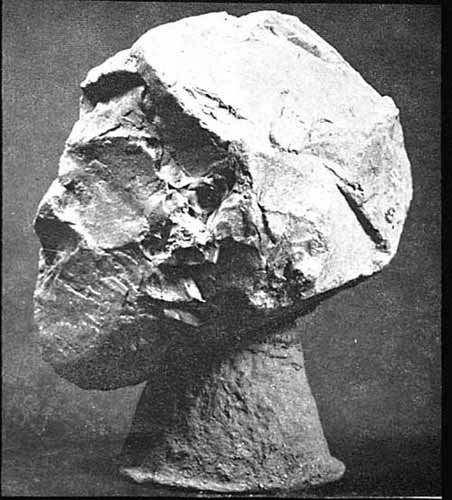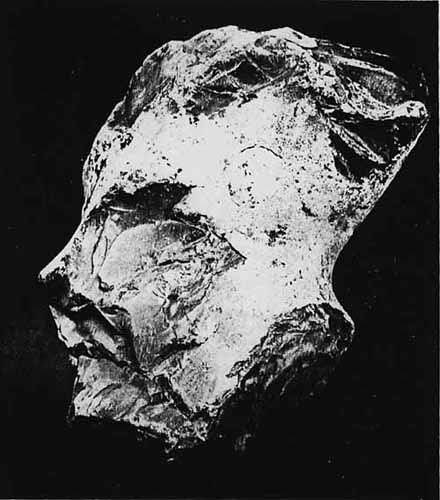Page 14 of 16
Posted: Wed Dec 06, 2006 4:34 pm
by Manystones
Posted: Wed Dec 06, 2006 4:55 pm
by Charlie Hatchett
Nice set of references there, bro.
I'll give them a hard looking over.

Posted: Tue Dec 12, 2006 9:32 pm
by AD
Greetings...
Been busy and just got caught up on the discussion. Bruce's stones shown at
http://www.bbrotemarkle.com/Album36/11_22_2006_029.html particularly the one on the right, do seem to incorporate the simple quasi-anthropomorphic imagery under discussion here. Is that quartzite? I'm wondering whether the red pigmentation is an integral part of the rock (chipped around to create the image?) or something artificially applied to its surface, like
http://www.daysknob.com/images/P03_03.JPG
Alan
Posted: Wed Dec 13, 2006 10:19 am
by Bruce
Allen,
The profile appears to shaped in the rock but the coloring as you say seems to be artifical. It doesn't wash off with water and I can't scrape it with my finger nail, not that I've tried very hard. I'm finding these in parking lots where they have brung rock from the river bottoms to landscape, so they've been knocked around pretty good. They call it their 2" washed rock. Here's a different view and some other examples.
http://www.bbrotemarkle.com/Album37/
Posted: Wed Dec 13, 2006 1:08 pm
by Charlie Hatchett
Posted: Wed Dec 13, 2006 2:24 pm
by Manystones
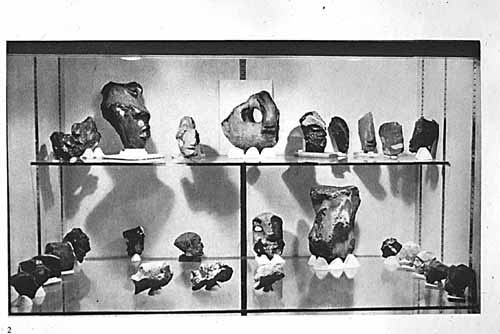
From the Walther Matthes collection courtesy of
http://www.originsnet.org/
Posted: Wed Dec 13, 2006 4:42 pm
by Charlie Hatchett
_______________________________________________________________
Local:
 http://cayman.globat.com/~bandstexas.co ... %20121.jpg
http://cayman.globat.com/~bandstexas.co ... %20121.jpg
 http://cayman.globat.com/~bandstexas.co ... %20122.jpg
http://cayman.globat.com/~bandstexas.co ... %20122.jpg
North African Acheulian :
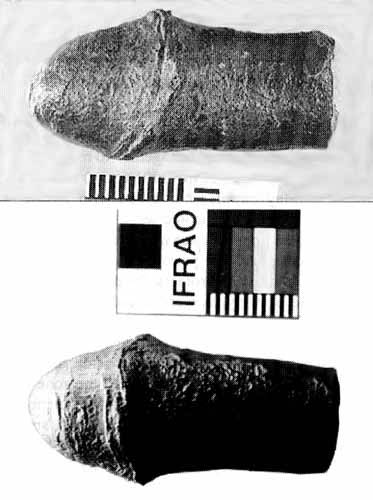 http://www.originsnet.org/nenatoolsfems/index.htm
http://www.originsnet.org/nenatoolsfems/index.htm
These guys were either quite proud of their peckers, or their women were quite pleased...

Posted: Wed Dec 13, 2006 4:51 pm
by Charlie Hatchett
Posted: Wed Dec 13, 2006 10:39 pm
by AD
Hi Bruce...
Thanks for the additional perspectives. Since there is red coloration in the rock itself, maybe the apparent guy with the two feathers is a natural feature opportunistically incorporated into a human-modified rock (they did that a lot!) - maybe chipped around to enhance the image, as I suggested earlier. The overall form of the rock certainly makes it look like an artifact candidate. Too bad it was away from its original context. This is maddening, as with two small apparent saddleback-style birdstones (Archaic?) I found a while ago, also in a parking lot, apparently hauled in among a load of river pebbles. If you feel certain that the red figure is of material foreign to the rock itself, I guess you could have this checked out by X-ray fluorescence (XRF) spectroscopy. Interesting, anyway...
Alan
Posted: Wed Dec 13, 2006 11:22 pm
by AD
These guys were either quite proud of their...
Yeah, Charlie... Phallic imagery is fairly common in the old rock art. People living together in the woods long ago had a more matter-of-fact attitude toward such things - not to mention the recurrent reproduction/regeneration theme. Just for fun, here's one from my own site - same location (within one meter) and lithic material as the bird pendant serving as my "avatar":
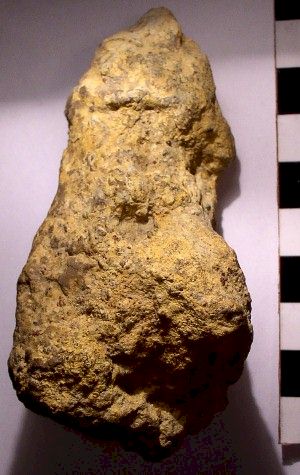
Note this guy's idiot grin (and the characteristic eye complete with iris) - gives a new (old) perspective on the expression "dickhead". (Excuse the vulgarity - and I didn't start this...) Maybe this is one of the oldest expressions of how women see the rest of us.
Alan
http://www.daysknob.com
Posted: Fri Dec 15, 2006 8:48 am
by Charlie Hatchett
Note this guy's idiot grin (and the characteristic eye complete with iris) - gives a new (old) perspective on the expression "dickhead". (Excuse the vulgarity - and I didn't start this...) Maybe this is one of the oldest expressions of how women see the rest of us.

That's too funny, Alan!
Posted: Wed Dec 20, 2006 8:20 pm
by AD
More wierdness... Again not British, but similar enough in form to the stuff Manystones is finding that it's more or less relevant. A fellow in Licking County, Ohio, not far from here, sent me photos of this object, found by his uncle in about 1983, and a little documentation. Apparently at least one geologist identified it as having being artificially modified. It was found at about 18 meters (60') down, at a strip mining operation, firmly in place, beneath deposits from the Illinoian glaciation (the one before last), stratigraphically placing it at at least 130,000 years BP. I have presented this find at
http://www.daysknob.com/RP.htm.
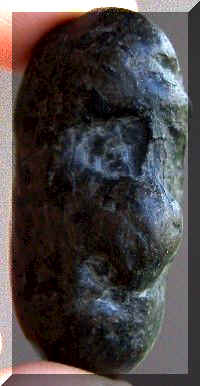
Alan
http://www.daysknob.com
Posted: Fri Dec 22, 2006 3:28 pm
by Manystones
Nice piece Alan.
Note the similarity in technique with the eyes on this piece also shown on your site.

How about this piece?


Posted: Fri Dec 22, 2006 11:10 pm
by AD
Hi Richard...
Nice! Yes, the eyes are very much a hallmark of this artifact genre, having (not surprisingly) received a lot of attention in their rendering, often in the deeply carved geometric outline, and even more often in the inclusion of a raised or indented iris; your first figure is a classic example of both. And of course the position of the eye(s) in relationship to a distinctly carved mouth identifies definite artifact candidates, as in both the figures you show.
So, I shall now sieze the opportunity to inflict upon everyone a fine example of another old motif that appears on both sides of the Atlantic, namely the "Sun Disk":
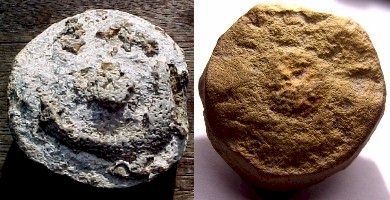
On the left is one from the collection of your friend David King, who also digs in an area known to produce many Paleolithic artifacts. The one on the right is from my own dig, with the distinctly circumscribed smiling face (sun?) in the center, a motif common in this hemisphere and familiar to most Americans from the wall decorations of Mexican restaurants.
Alan
http://www.daysknob.com
Posted: Sun Dec 31, 2006 2:01 pm
by Manystones










